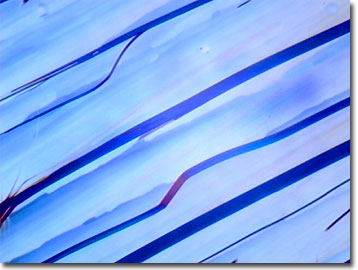Polarized Light Digital Image Gallery
Glucose
Glucose is one of the substances that corn and grapes have in common, and the fermentation of this natural sugar into whiskey or wine is what has made human civilization sometimes tolerable during tough times. Also known as dextrose, glucose is a six-carbon sugar or hexose and a monosaccharide.

View a second image of crystallized glucose.
View a third image of crystallized glucose.
Glucose is the unit from which starch, cellulose, and glycogen are composed, and is extremely important as one of the main energy sources for both plants and animals. In nature, this simple sugar is found in grains, fruits, and honey, and comprises one-half of a sucrose molecule, with another simple sugar, fructose (or levulose), forming the other half. Available in a synthesized form, glucose (or dextrose), also known as D-glucose and dextrosol, and features a molecular weight of 180.16. With 6 carbons, 12 hydrogens, and six oxygens (essentially one water molecule per carbon, thus the name carbohydrate), corn sugar is molecularly simple in structure as a chain or ring compound. Crystalline glucose is either colorless or found as a white crystalline powder that is odorless and soluble in warm water. Melting at 146 degrees Celsius, a 0.5 molar solution of glucose is acidic at pH 5.9.
Glucose was first isolated in 1747 from raisins by Adreas Marggraf and was named from the Greek glycos for sugar (or sweet) in 1838 by Jean Dumas. Refined from cornstarch, glucose is a sweetener widely used in foods and soft drinks and as a readily available source of energy. Commercially, glucose is produced by the enzyme conversion of cornstarch and then is refined by ion-exchange demineralization. In addition to pet foods, animal feed, and industrial applications, glucose is commonly used a carrier in water-soluble medications.
Contributing Authors
Omar Alvarado, Thomas J. Fellers and Michael W. Davidson - National High Magnetic Field Laboratory, 1800 East Paul Dirac Dr., The Florida State University, Tallahassee, Florida, 32310.
BACK TO THE POLARIZED LIGHT IMAGE GALLERY
BACK TO THE DIGITAL IMAGE GALLERIES
Questions or comments? Send us an email.
© 1995-2025 by Michael W. Davidson and The Florida State University. All Rights Reserved. No images, graphics, software, scripts, or applets may be reproduced or used in any manner without permission from the copyright holders. Use of this website means you agree to all of the Legal Terms and Conditions set forth by the owners.
This website is maintained by our
Graphics & Web Programming Team
in collaboration with Optical Microscopy at the
National High Magnetic Field Laboratory.
Last Modification Friday, Nov 13, 2015 at 01:19 PM
Access Count Since September 17, 2002: 13181
Visit the website of our partner in introductory microscopy education:
|
|
